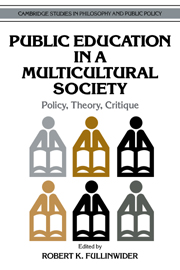Book contents
- Frontmatter
- Contents
- Contributors
- Preface
- PART I INTRODUCTION AND CRITIQUE
- PART II CULTURE AND IDENTITY
- PART III RELATIVISM, REASON, AND PUBLIC EDUCATION
- PART IV TEACHING HISTORY
- 8 Multiculturalism and history: historical perspectives and present prospects
- 9 Patriotic history
- PART V TEACHING LITERATURE
- Index
8 - Multiculturalism and history: historical perspectives and present prospects
Published online by Cambridge University Press: 05 June 2012
- Frontmatter
- Contents
- Contributors
- Preface
- PART I INTRODUCTION AND CRITIQUE
- PART II CULTURE AND IDENTITY
- PART III RELATIVISM, REASON, AND PUBLIC EDUCATION
- PART IV TEACHING HISTORY
- 8 Multiculturalism and history: historical perspectives and present prospects
- 9 Patriotic history
- PART V TEACHING LITERATURE
- Index
Summary
The furor in the popular press over multiculturalism in the schools has left many parents concerned about the history their children are taught. Some parents, especially among ethnic and racial minorities, feel that school history remains a narrow, Eurocentric course of study. Other parents worry that multicultural approaches to history are divisive and unscholarly. The concerns on both sides might be moderated by a better understanding of contemporary historical scholarship and a recognition of the potential strengths of school lessons informed by that scholarship.
This essay has two purposes. The first is to describe how far the writing and teaching of history have already moved away from the male-oriented, Eurocentric, and elitist approaches that were dominant for so long at all levels of the American educational system. It is important to acknowledge this because new calls for change often ignore what has already occurred in the rethinking and rewriting of history, and, as a result, sometimes prescribe irrelevant or misguided formulas. My second purpose is to show how multicultural approaches enhance, rather than diminish, the quality of historical analysis in the classroom.
REIMAGINING THE PAST
- Type
- Chapter
- Information
- Public Education in a Multicultural SocietyPolicy, Theory, Critique, pp. 183 - 202Publisher: Cambridge University PressPrint publication year: 1996
- 1
- Cited by



